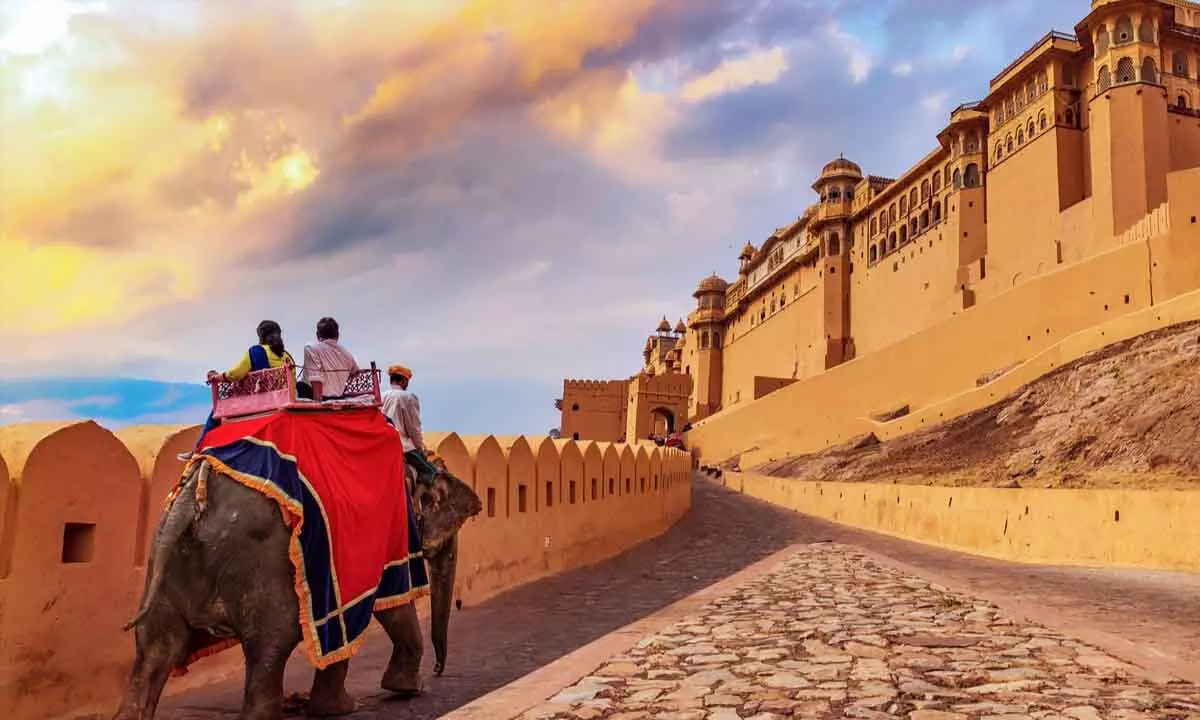Rajasthan's heirtage forts are drivers of state's tourism economy
Share :

Jaipur: Enclosed within the defensive walls stand six majestic forts in Rajasthan which are luring tourists from across the world bespeaking the story of eclectic architecture and bearing testimony to the power of the Rajput princely states that flourished in the region from the 8th to the 18th centuries.
These pristine yet majestic forts stand straight with pride in Chittorgarh, Kumbhalgarh, Sawai Madhopur, Jhalawar, Jaipur and Jaisalmer, and have been included in the UNESCO World Heritage sites.
These sites are defined as the cultural and/or natural sites considered to be of 'Outstanding Universal Value' and have been inscribed on the World Heritage List by the World Heritage Committee. These places or buildings are thought to have special importance for everyone.
These forts bespeak the story of rich cultural legacy and heritage of Rajput rule in Rajputana state and have now emerged as the epicentre of culture and heritage, boosting the economy for the state.
Member, Economic Advisory Council to the Prime Minister of India, Sanjeev Sanyal, said, “The sites of Haldighati, Chittorgarh and Kumbhalgarh in Rajasthan have great stories of resistance to foreign domination. The heritage hotels need to revive bardic traditions and re-tell the stories of our past. The stories of local communities should be re-packaged in a modern way and we must re-tell India’s narrative for the 21st century.”
“Storytelling and narrative building is an important part of running the economy. Instead of imbibing someone else’s narrative, the need is to tell our own story,” he added.
Sanyal shared his thoughts in his recent presentation on ‘Thinking of Heritage as Economic and Cultural Capital’ in Alwar.
Former CEO, Niti Aayog, Amitabh Kant said, “India is positioned at the forefront of global economic growth, poised to become the world's third-largest economy by 2027. The primary engine driving this growth within the local economy is tourism.
"Tourism is also key to achieving equitable growth. Tourism today has moved beyond elitism and lavish 5-star accommodation and instead focuses on providing unique experiences. Heritage properties are pivotal in this paradigm shift, as they redefine the concept of luxury and create unique and memorable experiences for visitors."
Kant further emphasised the importance of revitalising a place's cultural heritage by breathing life into its roots. "Traditional art forms, cuisines, architecture, and more should be actively promoted as distinctive products. The government, in this regard, should play the role of a catalyst, facilitating these efforts and ensuring the provision of last-mile connectivity. However, the responsibility for the operation and management of these ventures should rest with private partners."
President of IHHA, Randhir Vikram Singh Mandawa, opines that with a singular strive to promote heritage tourism in India, tapping into heritage potential is important and hence their association “focuses on unleashing the heritage potential for domestic tourism. Sustainable preservation is one of the important aspirations for the future of heritage tourism, he added.
Enclosed within these forts are major urban centres, palaces, trading centres and other buildings including temples that often predate the fortifications within which developed an elaborate courtly culture that supported learning, music and the arts.
Many of these urban centres enclosed in the fortifications have survived, as have many of the sites' temples and other sacred buildings.
The USP of these forts is the fact that they use the natural defences offered by the landscape -- hills, deserts, rivers, and dense forests. They also feature extensive water harvesting structures, largely still in use today. In fact, these forts speak the story of rich heritage and cultural legacy of our country.
Neemrana Hotels Founder Aman Nath said that the heritage custodians should actively work against the prevailing trends to safeguard these ancient forts and palaces.
